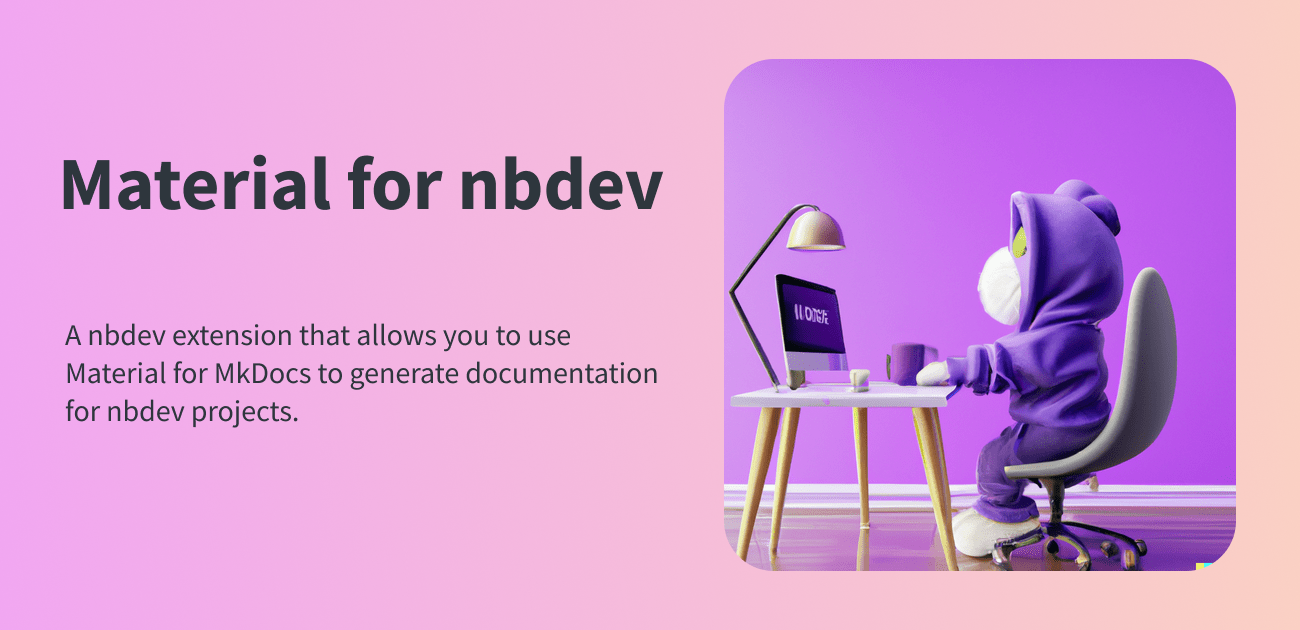
Security News
Meet Socket at Black Hat and DEF CON 2025 in Las Vegas
Meet Socket at Black Hat & DEF CON 2025 for 1:1s, insider security talks at Allegiant Stadium, and a private dinner with top minds in software supply chain security.
Extension of nbdev for generating documentation using Material for Mkdocs instead of Quarto

Documentation: https://nbdev-mkdocs.airt.ai
Source Code: https://github.com/airtai/nbdev-mkdocs




Material for nbdev is a nbdev extension that allows you to use Material for MkDocs to generate documentation for nbdev projects.
The key features are:
Here’s a quick comparison of Quarto and Material for nbdev development workflows:
| Quarto workflow | Material for nbdev workflow |
|---|---|
|
Install: |
Install: |
|
Setup: |
Setup: |
|
Development: |
Development: |
|
Commit changes: |
Commit changes: |
The following quick start guide will walk you through installing and configuring nbdev-mkdocs for an existing nbdev project. It also assumes you’ve already initialized your project with nbdev and installed all of the required libraries.
For detailed installation instructions and configuration options, please see the User Guide.
nbdev-mkdocs is published as a Python package and can be installed with pip:
pip install nbdev-mkdocs
Note that nbdev-mkdocs must be installed in the same Python
environment as nbdev.
If the installation was successful, you should now have the nbdev-mkdocs installed on your system. Run the below command from the terminal to see the full list of available commands:
nbdev_mkdocs --help
Usage: nbdev_mkdocs [OPTIONS] COMMAND [ARGS]...
╭─ Options ────────────────────────────────────────────────────────────────────╮
│ --install-completion Install completion for the current shell. │
│ --show-completion Show completion for the current shell, to copy │
│ it or customize the installation. │
│ --help Show this message and exit. │
╰──────────────────────────────────────────────────────────────────────────────╯
╭─ Commands ───────────────────────────────────────────────────────────────────╮
│ delete-pre-release-docs Deletes deployed pre-release documentation │
│ versions. │
│ docs Prepares files in 'mkdocs/docs' and then runs │
│ 'mkdocs build' command on them. │
│ docstring Command for adding docstrings to classes and │
│ methods that don't have one using docstring-gen │
│ library. │
│ new Creates files in 'mkdocs' subdirectory needed for │
│ other 'nbdev_mkdocs' subcommands. │
│ prepare Runs tests and prepares files in 'mkdocs/docs' and │
│ then runs 'mkdocs build' command on them. │
│ preview Prepares files in 'mkdocs/docs' and then runs │
│ 'mkdocs serve' command on them. │
│ readme Updates the README.md file from the 'readme_nb' │
│ notebook. Unless explicitly changed in the │
│ settings.ini file, the 'readme_nb' points to the │
│ 'index.ipynb' notebook in the 'nbs_path' directory. │
│ social-image Command for generating a custom social share image. │
╰──────────────────────────────────────────────────────────────────────────────╯
After installing nbdev-mkdocs, bootstrap your project documentation by executing the following command from the project’s root directory:
nbdev_mkdocs new
Using information from the project’s settings.ini file, the above command creates files and directories required to build the documentation and saves it in the mkdocs subdirectory.
Note: You should only run the nbdev_mkdocs new command once for the project to initialise the files required for building Material for MkDocs documentation.
nbdev_mkdocs lets you preview your changes as you write your documentation. Execute the following command from the project root directory to start a local server, and preview your documentation:
Note: If you haven’t already installed your library locally, run
pip install -e '.[dev]' command before running the
nbdev_mkdocs prepare command.
nbdev_mkdocs preview
To prepare your changes for Git push, we recommend executing the following commands:
First, run the nbdev_mkdocs prepare command in the terminal. This
command exports the library, runs tests, and cleans the notebooks.
nbdev_mkdocs prepare
Then, run the nbdev_mkdocs readme command to update the README.md file
from the ‘readme_nb’ notebook. By default, ‘readme_nb’ points to
‘index.ipynb’ notebook in the ‘nbs_path’ unless modified in the
settings.ini file.
This command does everything the ‘nbdev_readme’ command does, plus it generates symbol references that are compatible with ‘Material for nbdev’.
nbdev_mkdocs readme
Finally, double-check your settings.ini file to ensure that it has all of the correct information. Then commit and push your additions to GitHub:
git commit -am'Commit Message'
git push
Copyright © 2022 onwards airt technologies ltd, Inc.
This project is licensed under the terms of the Apache License 2.0
FAQs
Extension of nbdev for generating documentation using Material for Mkdocs instead of Quarto
We found that nbdev-mkdocs demonstrated a healthy version release cadence and project activity because the last version was released less than a year ago. It has 1 open source maintainer collaborating on the project.
Did you know?

Socket for GitHub automatically highlights issues in each pull request and monitors the health of all your open source dependencies. Discover the contents of your packages and block harmful activity before you install or update your dependencies.

Security News
Meet Socket at Black Hat & DEF CON 2025 for 1:1s, insider security talks at Allegiant Stadium, and a private dinner with top minds in software supply chain security.

Security News
CAI is a new open source AI framework that automates penetration testing tasks like scanning and exploitation up to 3,600× faster than humans.

Security News
Deno 2.4 brings back bundling, improves dependency updates and telemetry, and makes the runtime more practical for real-world JavaScript projects.